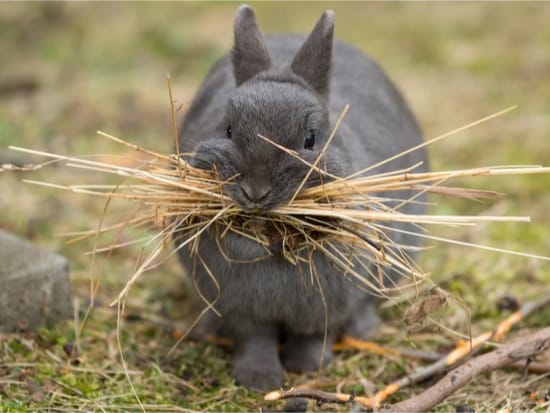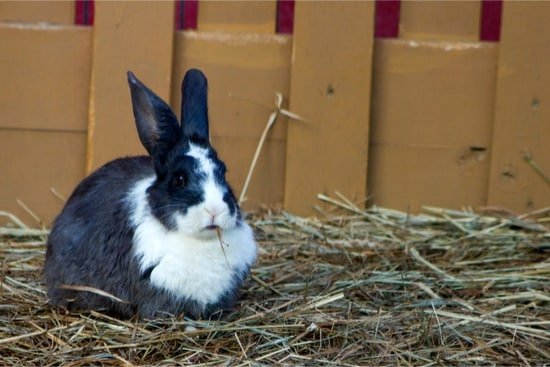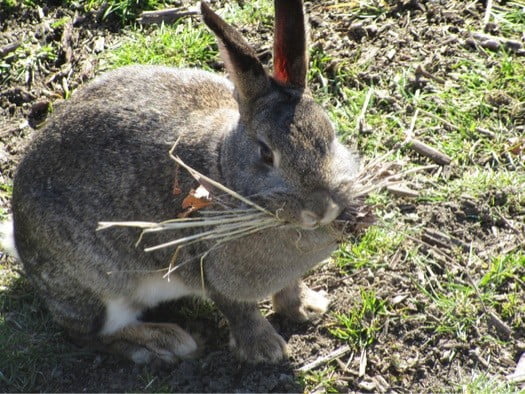While your pet goes about their business, you may notice your rabbit filling their mouths with hay. We don’t mean that they’re eating it. Bunnies do this all day, every day. We’re referring to a rabbit carrying hay from one side of their hutch to the other.
Pregnant bunnies are hardwired to build a cozy nest for their young. Unspayed females also experience false pregnancies. Alternatively, your rabbit may just be seeking extra warmth and comfort.
It’s vital to learn why your bunny is carrying hay. Even if you don’t need a family-sized hutch, there will be an explanation. Your rabbit could be feeling insecure about their social status, or their feeding schedule. We will look at all of the possible reasons for a rabbit to carry hay in their mouths.
Why is My Rabbit Filling Their Mouth with Hay?
Of all the strange habits that rabbits have, this one of the most curious. Rabbits typically stuff their mouth with hay for three reasons:
- They’re being territorial. They are saying, “this is my hay, and you can’t have it.” This may be directed at you, or another bunny in their hutch.
- Storing food for later. While cheek stuffing is associated with rodents, rabbits do it too.
- Moving hay around. Usually, it will end up in their bed. This is known as nesting.
Some of these actions make no sense from a human standpoint. As far as a rabbit is concerned, though, they’re perfectly rational. Let’s look a little deeper into why bunnies act this way.
Why Does My Rabbit Protect Their Hay?
Rabbits get territorial when they feel they are not at the top of the house hierarchy. Bunnies are dominant by nature. They’ll protect what’s theirs unless they feel completely at ease.
If they feel the need to protect their food from you, spend more time with them. At present, your rabbit sees you as a rival for dominance. The more you groom and pet them, the more relaxed they’ll become. This will boost your bond, too.
Your bunny keeping the hay from another rabbit is another power play. The two animals have not yet established who is the alpha in their dynamic. This also suggests that they are not bonded yet.
Let the two bunnies work this out among themselves. If the rabbits start to fight, they must be separated. Bonding can be difficult if bunnies consider each other enemies.
Why Do Rabbits Store Food for Later?
It may seem bizarre that your rabbit saves food for later. After all, you feed them every day. Rabbits will have their reasons for feeling insecure about food, though.
One potential explanation is that you have not stuck to a routine. Bunnies like to know they will be fed at a particular time each day. If you deviate from this, they’ll know.

As a result, a rabbit will ensure they can eat when they’re ready. Sticking to a strict routine should eradicate this behavior. They’ll soon trust that their needs are understood and respected.
You may also have changed the brand of hay in your bunny’s hutch. Maybe you altered the type, such as switching from timothy hay to oat hay. Your rabbit may be stockpiling their favorite tastes, in case their hay changes again.
If you’re consistent with how much hay you provide daily, your bunny shouldn’t be afraid of going hungry. Do observe their behavior, though. Also, make sure they’re actually eating the hay they hoard. If hay goes moldy, it can be fatal.
Bunny Nesting Behavior
Nesting is when a rabbit uses hay – or other materials – to build a warm and cozy nest. They carry the hay from their main hutch into their sleeping area.
The most likely explanation for nesting is pregnancy. Female rabbits are driven by an instinct to build a nest to protect their young. Hay isn’t all they use. A pregnant female will also tear chunks of her fur out to line a nest.
If your rabbit is pulling their fur out, provide a nesting box. This will calm them down, and prevent any further self-mutilation.
Is My Bunny Pregnant?
There are numerous telltale signs that a female rabbit is pregnant. Aside from nesting, these include:
- Character Changes. Pregnant rabbits are cranky. She’ll avoid interacting with you, and growl if you try to handle her. These moods will last the duration of the pregnancy.
- Showing. A pregnant rabbit starts to show at around 10-14 days. Slide your hand under your bunny’s abdomen. You should feel a series of soft lumps on either side.
- Digging. A pregnant rabbit will dig furiously, especially in the corner of her hutch. This is another instinct. Wild bunnies dig deep warrens, so they have space and privacy to give birth.
- Kicking Babies. They’ll start kicking toward the end of a pregnancy.
This could raise red flags, though. If your bunny has not encountered an intact male, how could she be pregnant? In all likelihood, she isn’t. Unspayed female rabbits sometimes experience what is known as a false pregnancy.
What is a False Pregnancy in Rabbits?
As the name suggests, false pregnancy occurs when a rabbit erroneously believes she will give birth.
This may happen when a neutered male mounts a female. Fixed rabbits mount in an attempt to assert dominance. Bunnies can experience false pregnancy without any interaction with other rabbits, though.
A rabbit that experiences false pregnancy will behave the same way as a pregnant bunny. They’ll become aggressive, and feel compelled to nest. Digging is less frequently observed.
A false pregnancy lasts around three weeks. A pregnant bunny will prepare their final nesting at approximately 18 days. The hormones of a rabbit with a false pregnancy will return to normal at this stage.

How Can I Tell if My Rabbit Has a False Pregnancy or Real Pregnancy?
Unfortunately, there is no such thing as a rabbit pregnancy test. This means that you will not know if your bunny is pregnant for 18 days.
At this stage, a rabbit with a false pregnancy will lose interest in nesting. They’ll stop pulling out their fur, and they’ll likely stop moving hay around. More importantly, they’ll go back being the lovable, affectionate bunny that you know.
All the same, it may pay to expect the unexpected. Unless your rabbit is spayed, you’re not in the clear until around day 35. If they haven’t given birth by then, they never will.
How to Deal with a False Pregnancy in Rabbits
If your rabbit is experiencing a false pregnancy, treat them as though they’re pregnant. Don’t attempt too much handling. Your bunny will bite and kick.
Keep providing plenty of fresh hay. If you can, provide a nesting box too. This calms a pregnant bunny down. You can always remove it once the false pregnancy runs its course.
Wherever possible, avoid false pregnancy by spaying your bunny. They will experience all the symptoms of the real deal, and the associated health risks. Your rabbit will develop mastitis, and will be stressed and anxious.
Avoid housing bunnies of the opposite gender in the same hutch unless both are fixed, too. Simply neutering a male is not enough. An intact female will still experience the hormonal fluctuations associated with pregnancy.
Neutered males and spayed females can get along famously. They’ll both be calm, and content to share space. False pregnancies, and the issues that come with them, will also no longer be a concern.
Why is My Male Rabbit Nesting?
A male rabbit can experience pregnancy, false or otherwise. They still display nesting behaviors on occasion, though.
Sometimes, this is because they just want a warmer bed. If the temperature drops at night, they may be getting chilly. Equally, your rabbit might be bored. Nesting gives them something to do while they’re in their hutch.
Rabbits of any gender can be particular. No matter how hard you try, you won’t get their bedding just how they like it. Nesting means that they will be completely comfortable.
Unless your bunny has been wrongly sexed, this is nothing to worry about. If you’re concerned that this is a possibility, check this guide to sexing rabbits from PetCoach.
Bunnies carrying hay around is perfectly normal behavior. Naturally, if your female is pregnant, you will have some significant changes ahead of you. Otherwise, the action can be easily remedied.
Reassure your bunny that they call the shots, and keep to a regular schedule. This, coupled with a consistent allocation of hay, will be enough to keep your pet happy.

